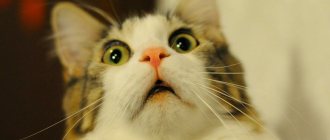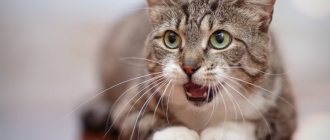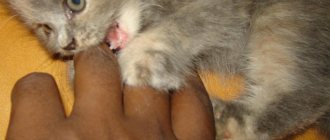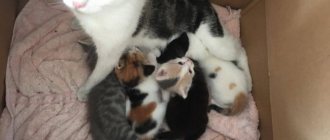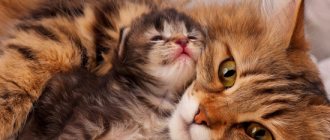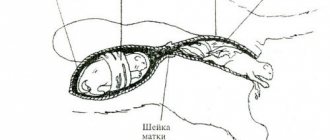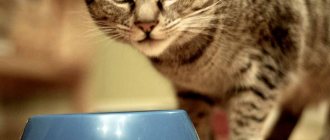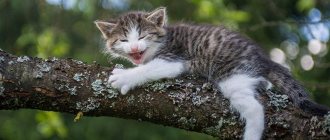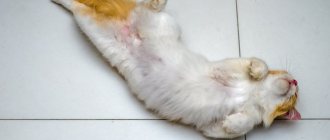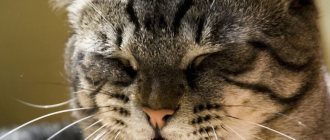At what age can a cat become pregnant: stages of pregnancy
Several factors influence when felines begin to reproduce:
- breed;
- heredity;
- the beginning of the first heat;
- health status;
- place of residence (house, nursery, street);
- individual characteristics.
Owners should know how to protect their cat from another pregnancy
In ordinary cats, the first heat occurs at the age of 7-9 months. Puberty in Scottish Fold cats begins at 8-12 months. Therefore, the possibility of getting pregnant begins from this moment. Large and long-haired breeds mature later. The Maine Coon's first heat occurs at 11-15 months.
Sphynx maturation occurs in the interval of 6-10 months. Outdoor cats can become sexually active before 5 months. Therefore, owners should take this data into account when keeping their pet and when planning mating.
At the time of her first heat, the female cat is considered fully sexually mature and ready to bear kittens.
Interesting! Felines do not go through menopause, so their ability to give birth continues throughout their lives.
The entire pregnancy takes from 59 to 70 days, depending on the individual characteristics and breed.
Kittens appear 9-10 weeks after conception
The time from fertilization to birth is divided into 6 periods:
- Beginning of gestation (from 18 days). At this stage, pregnancy is poorly expressed, the cat’s behavior practically does not change, except that the appetite increases.
- The next stage lasts from 20 to 30 days of pregnancy. At this time, the stomach becomes noticeably larger, the mammary glands swell.
- 3-5 weeks of gestation. During this period, babies are actively growing in the stomach and occupy a comfortable position.
- 5-8 weeks. The cat's belly visibly swells, and the pet begins to look for a corner to give birth.
- 8th week - the cat becomes noticeably nervous, becomes lethargic, and refuses to eat. At this stage, babies begin to develop hair and their height is 6-10 cm.
- The last stage during which the kittens are noticeably actively moving. At 9-10 weeks, babies are born.
Why does a neutered cat mark its territory?
A cat may continue to mark its territory after surgery in the following cases:
Cryptorchidism is a pathology in which one or both testes do not descend into the scrotum, but remain in the pelvic area. Since the temperature in the abdominal cavity is higher, the level of hormones in cryptorchids is much higher. Why do such animals behave aggressively? During surgery, a normal doctor should notice this feature and perform abdominal surgery. But if the veterinarian removed only one testicle, the hormones will continue to be produced, but the cat's behavior will remain the same.
Little time passed after the operation, which is why the amount of hormones did not have time to decrease. In addition, the animal can maintain the habit for some period even with a decrease in the number of hormones in the blood.
We operated on an adult pet who had already entered into relationships with cats. If, as a result of the activity of hormones, he has formed a strong habit of marking the boundaries of his personal territory, then it may not disappear for a long time after castration. If the behavior persists for more than six months, the pet should be shown to a veterinarian or animal psychologist.
Competition for territory with other animals. This is especially true if there is another cat in the apartment. In this case, the habit of marking territory will be stimulated by an external stimulus. As a result, the pet may not get rid of the dishonest reflex for quite a long time.
Stress. When moving or replacing furniture, your cat may want to make the new environment smell more familiar. Of course, why would he urinate in all corners?
In addition, this is a great way to attract the attention of the owner, albeit with a negative sign. Thus, defecation in the wrong places during stress is just a measure of psychological protection
Change of owner
In this case, the uncertainty of a new relationship is added to the stress. The animal does not understand whether it is necessary to follow the old rules in the current conditions. In particular, will the owner demand that the cat go exclusively to the potty. Of course, the assumption is tested in practice.
The arrival of a new pet
In this case, competition for the owner's attention arises. The cat may behave aggressively towards its neighbor, become capricious, or get sick
An option to attract attention would be to defecate in different places. In addition, the tags warn the competitor that he is redundant.
Indifferent attitude of the owner towards the pet. It may seem that cats are too individual and independent to need the attention and affection of their owner. But in reality they strive for love, just like everyone else
If they don’t get enough of it, they may start doing things in inappropriate places to attract attention.
Urolithiasis disease. At the same time, stones form in the bladder. Because of which the animal has problems with urination. The pet behaves restlessly, refuses to eat, and constantly tries to pee, but it fails. As a result, due to endless unsuccessful attempts to relieve itself, the animal may begin to defecate in any place.
Cystitis. As a result of inflammation, the irritability of the bladder walls increases. As a result, the animal is forced to frequently run to the toilet, and this often leads to the fact that the pet begins to defecate before reaching the litter box.
How often can a cat give birth?
At what age can a cat become pregnant for the first time?
Experts cannot accurately answer the question of how many times a cat kittens a year, because the process depends on many factors. Since pregnancy takes a lot of energy and also affects the general condition of the animal, it is not advisable to breed a cat more often than once every 8 months. Pedigree cats should give birth once a year.
This regime allows the body to fully rehabilitate and gain strength to raise new offspring. In addition, professional breeders do not recommend breeding cats that are over 7 years old.
Older cats may have complications during pregnancy
How long after giving birth can you plan to conceive?
To understand how many times a year cats give birth, it is necessary to take into account that after giving birth, the next heat occurs 1.5-2 months later.
What to feed a cat after giving birth: proper nutrition and care
It is believed that at this moment the animal can become pregnant. If there is no control over mating, cats can produce offspring 2-5 times a year. However, frequent pregnancies are harmful to the health of the pet, since the body does not have time to recover and exhaustion occurs.
There is no need to plan for conception when the cat is busy feeding past offspring. Otherwise, babies will not receive enough microelements.
Important! Ideally, there should be 6 to 12 months between matings.
This period ensures complete restoration of the cat’s physical condition, as well as hormonal levels. For example, British cats are mated no more than 3 times every 2 years.
conclusions
People who own cats should be aware that after giving birth the cat may go into heat. If you follow the deadlines for the period intended for rehabilitation, this will not only help preserve the health of the feline representative, but also wait for full-fledged offspring in the form of healthy kittens.
Thus, the conclusion is this: a nursing cat can become pregnant (sometimes even from a castrated cat) , and the owners need to draw certain conclusions: allow pregnancy or prevent it.
Cat pregnancy and the subsequent birth are complex and not easy for the furry pet, as well as for its owner. Of course, as soon as cute fluffy kittens are born, a person dreams of a break - he intends to take a break from the mating rush of the cat and her quirks when she was pregnant. But it’s too early to relax, because a cat can become pregnant very soon after giving birth, breastfeeding squeaking blind kittens. How this can happen will be discussed below.
Possibility of pregnancy while breastfeeding
When kittens open their eyes: how many days after birth
To understand whether a nursing cat can become pregnant, you need to understand the processes occurring in the body.
There is an opinion that it is impossible to get pregnant during lactation due to the action of the hormone prolactin, which blocks the maturation of follicles and ovulation. However, this hypothesis has not been confirmed, since ovulation in cats occurs during sexual intercourse, and not before it.
Pregnancy is possible only with the onset of estrus, which occurs at different times.
Some representatives are ready for mating within 1-1.5 months after birth
Restoring reproductive health
Pregnancy, subsequent births, care and feeding of kittens do not have the best effect on the cat’s condition. Even in case of good health, she needs time for rehabilitation and restoration of reproductive function.
Curvature of the spine in a cat
The birth of kittens requires significant energy expenditure from the female. Many animals lose weight after giving birth. The formation of embryos, the growth of fetuses, subsequent childbirth and milk feeding lead to the fact that the mother’s body suffers large losses of vitamins and minerals. A characteristic feature of the reproductive period is a deficiency of minerals such as calcium, phosphorus, and magnesium. Often, after the next lambing, a deficiency of mineral substances leads to a change in the skeleton of the pet - deflections of the back are formed, the spine is bent.
Pregnancy and childbirth do not have the best effect on a cat's reproductive health. The animal's body experiences constant hormonal changes. During estrus, estrogens are produced, which stimulate follicle growth and ovulation of eggs. When pregnancy occurs, the female’s body is influenced by the hormone progesterone, which is responsible for the implantation of embryos in the uterus and the normal course of pregnancy. Childbirth is characterized by a sharp increase in the level of oxytocin, which is responsible for contracting the smooth muscles of the uterus and preparing the mammary gland for feeding the offspring. And during feeding, the hormone prolactin is produced.
Such transformations in the body over a short period of time exhaust the animal and can lead to the development of hormonal imbalances. Therefore, a recovery period is required after the next lambing. Experienced owners know that when a cat begins to ask for a cat after giving birth, it is necessary to take measures to prevent pregnancy. The animal must be given sexual rest and measures must be taken to restore strength and health.
Much attention should be paid to mineral nutrition. The animal's diet during the rehabilitation period should contain increased amounts of calcium, phosphorus, and magnesium. For better absorption of minerals, vitamin supplements should be introduced, especially vitamin D, without which calcium is practically not absorbed into the body. When feeding your pet natural food, you should increase the proportion of dairy products, which are sources of calcium for the body.
A veterinarian will help you select the most effective drug based on a clinical examination of the animal and a biochemical blood test.
What to do if a nursing cat becomes pregnant again
If the cat turns out to be pregnant again, there are several options for the development of events:
- You can not terminate the pregnancy and let the cat lamb. If the owners do not want to accept kittens in the future, then the pet should be immediately taken to the veterinarian, where the sterilization procedure will be carried out.
- Have an abortion. It is done no later than the 5th week of pregnancy. In this case, an operation is performed during which the embryos are removed through an incision in the uterus.
- Contact your veterinarian to have the embryos immediately removed and sterilized.
- Medical abortion using medical drugs. It should be remembered that medications must be prescribed by a doctor.
How to prevent pregnancy in a nursing cat
If the owners do not breed offspring, it is recommended to sterilize the animal. For most breeds, the optimal time for the procedure is 6-12 months. It is possible to perform surgery on a nursing mother to prevent unwanted fertilization.
Contrary to misconceptions, a nursing cat can become pregnant
In addition to surgical intervention, you can give your pet medications based on medicinal herbs (for example, Fitex). It is necessary to monitor your pet's behavior, especially if she goes into heat after giving birth.
The most successful option is to exclude the female from communicating with cats.
Important! Do not use alcohol tinctures or valerian. These remedies do not calm the cat's desire, but only intensify it.
ZooForum: the cat is not pregnant after mating, there is discharge - ZooForum
(others can give advice in a PM, indicating that the advice is not given by a veterinarian. But the forum is not responsible for THESE advice.)
the cat is not pregnant after mating, is there discharge, is it a false pregnancy or what is it?
Then she did not walk for 2 months. When she went into heat, she was mated, but after a while she began to have a brownish discharge. We went to the doctor. They did an ultrasound, the doctor said it was a false pregnancy, but according to the ultrasound everything seemed to be fine. They prescribed Roncoleukin for 3 days in a row and said that after it the discharge would go away and soon she would be in heat again. She pierced Ronco, the discharge went away, and after 2 weeks she went into heat. Mating for 4 days with the same cat. After 21 days after mating, the cat showed no signs of pregnancy. And yesterday the cat started pushing! and contractions! I sat down next to her in shock, she was pushing as if she was about to give birth, but a few drops of blood flowed out and that was it. After half an hour it was all gone. Only the discharge doesn’t go away, now it’s brownish in color again. Today in the morning, she and I ran to the doctor. But since private doctors don’t work on Sunday (the first time we had an ultrasound done in a private clinic), we went to the city one, since an urgent consultation was required. They did an ultrasound for us, but the doctor didn’t see anything else other than gas lights. He prescribed us to inject the placenta for 5 days. And that’s all for now. When asked why the cat was having contractions and where the blood came from, he did not answer anything intelligible. Yes, there are no fetuses in the uterus, he said that for sure.
Dear doctors, tell me what’s wrong with my cat? Outwardly she is completely healthy, excellent appetite, playful, weight 4100, normal temperature.
False pregnancy in a cat is quite rare, especially with pseudobirth. How does the cat feel now? On what day of the “pregnancy” did she give birth?
False pregnancy in a cat is quite rare, especially with
Source
Drugs to protect against pregnancy
Pregnancy can be prevented with pills or injections.
Injections stop estrus for a period of six months to a year. They must be administered before the cat asks for it.
Important! Any medical procedures must be carried out under the supervision of a veterinarian.
The advantage of the injections is that the ability to become pregnant is only blocked and after a while, the pet will be able to become a mother again. Such drugs are easy to get at a pet store.
Despite the positive aspects, injections can cause side effects, especially in animals older than 5 years.
Popular products in this category include:
- Depot Promon. This drug blocks the onset of estrus by acting on the brain centers. As a result, hormone production decreases and ovulation does not occur.
- Covinan - eliminates estrus for a period of 4 to 6 months. You should not waste your time with this drug, as it will not be able to protect against pregnancy if it is administered late. The injection is given before the onset of estrus to prevent its onset and reduce the cat's desire.
- Depo Provera is a synthetic drug designed to interrupt estrus, and accordingly protects against pregnancy. Compared to other contraceptives, Depo Provera has virtually no side effects.
In addition to injections, pregnancy can be prevented using tablets of natural or chemical origin.
Natural formulations include herbal ingredients that minimize the risk of side effects. The disadvantage of tablets is their short duration of action.
Chemical-based medications are more effective, but often have a negative impact on your pet’s health.
New generation of contraceptives for cats
Experts identify a number of the following birth control pills for cats:
- Libidomin - eliminates estrus and ovulation, reduces the animal's desire, has a quick effect.
- Gestrenol - prevents unwanted pregnancy and reduces sexual desire.
- Sex barrier - eliminates sexual desire and blocks the possibility of getting pregnant.
- Counter sex - reduces the production of hormones and removes sexual arousal.
- Antisex - prevents the onset of estrus, blocks ovulation and excessive excitability.
When the pet is no longer able to produce kittens
Having dealt with the question of how often cats give birth, it is necessary to determine the age at which mating should be stopped. The behavior and body characteristics of animals allow them to give birth throughout their lives.
A kitten can be born even from an old cat. Usually in this case the number of cubs is no more than 2. Despite the high fertility, it is not advisable to breed a pet that is more than 7 years old. When this age is reached, the animal is sterilized to avoid unnecessary problems.
Pregnancy is a difficult test for the body of an adult cat. Therefore, there is a risk of not only harming the pet’s health, but also producing weak offspring.
Every owner is interested in the question of how the pet’s pregnancy is going, how long it will take for her to have kittens again, and also how to choose the optimal period for breeding. Knowing the nature of cat health, owners will be able to create comfortable conditions for the animal’s life, and also prevent the appearance of unwanted offspring.
